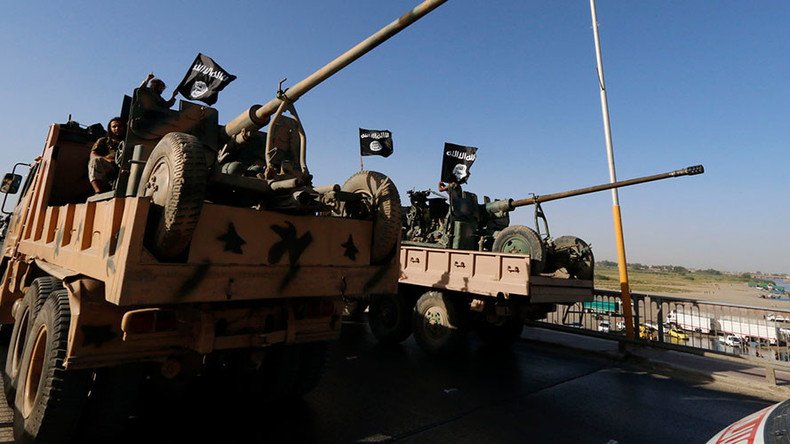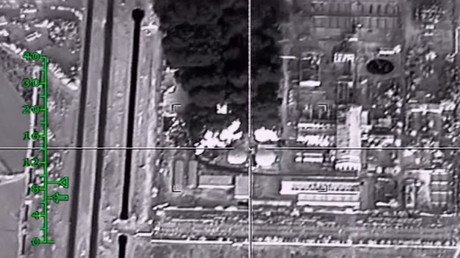Islamic State in financial pit, income halved since 2014 – study

Islamic State (IS, formerly ISIS/ISIL) has been experiencing deep financial troubles, with the average income dropping by a half since the terrorist group advanced in Syria in 2014, a new study has found.
“In the years since 2014, Islamic State’s annual revenue has more than halved: from up to $1.9bn in 2014 to a maximum of $870mn in 2016. There are no signs yet that the group has created significant new funding streams that would make up for recent losses,” a report, released by the London-based International Center for the Study of Radicalization (ICSR) and accounting group Ernst & Young on Friday states, predicting that “with current trends continuing, the Islamic State’s ‘business model’ will soon fail.”
The group made major gains in Syria and Iraq in 2014, when it declared a Caliphate and its fighters began looting banks, taking over oil fields and introducing taxes on the territories they took over. These became the group’s main sources of income, but, according to the study, all of them saw a “dramatic decline” in the course of the past two years with local fighters starting to push back militants with air support from Russia and the international coalition.
“All three of [IS’s] major sources of revenue – taxes, oil, and looting – have declined. This is particularly true for looting and confiscations, which depend on the group’s ability to capture new territory,” the study states, noting that, according to figures provided by the Global Coalition, by November 2016, Islamic State had lost 62 percent of the territory in Iraq it had in mid-2014, as well as 30 percent of the land it occupied in Syria.
“From a revenue perspective, this means fewer people and businesses to tax and less control over natural resources such as oil fields,” the study concludes. Previous studies showed that the group was trying to compensate for income losses, which became apparent in 2015, by levying heavier taxes, but as the latest figures show, it has not improved the situation much.
Some of the drop in IS revenues was also due to bombings of oil sites in IS-controlled areas.
“For 2014, the revenue from oil was between $150–450mn [...] Their continued exploitation over the course of 2015 resulted in a net increase to $435–550mn. However, since the launch of Operation Tidal Wave II in October 2015... revenues have significantly declined. This, combined with the loss of control of key oil markets in northern Syria and western Iraq, resulted in a much lower estimate of $200–250mn for 2016,” the report stated.
The report mentions Operation Tidal Wave II, the US-led coalition’s military campaign against IS’ oil industry, but makes no mention of Russian airstrikes, which over the past several months have destroyed numerous terrorist oil convoys, and refining and distribution facilities, despite the fact that Russia had repeatedly presented evidence of these assaults. Moreover, the Russian Defense Ministry recently stated that the US-led international coalition did not bomb oil production facilities captured by IS at all.
“Miraculously, only oil fields captured by ISIS, allowing the militants to earn tens of millions of dollars every month on illegal oil sales and recruit mercenaries from all over the world, did not come under the US bombardment,” Ministry spokesman Major General Igor Konashenkov said last month.
The ICSR report also dismissed two other sources of IS income as insignificant: ransom money paid for kidnapped foreigners and the sale of historical artifacts. As for foreign donations, researchers stated they “could find no hard evidence of such donations or other external income.”
Given their findings, the researchers conclude that the terrorists’ finances will shrink further, but that doesn't necessarily mean there will be fewer attacks.
READ MORE: Direct targeting: Civilians make up almost half of Mosul casualties, says UN
“There are good reasons to believe that Islamic State revenues will further decline. In particular, capturing Mosul, the Caliphate’s ‘commercial capital,’ will have a significant detrimental effect on Islamic State finances.
“Nevertheless... the decline in revenues may not have an immediate effect on the group’s ability to carry out terrorist attacks outside its territory. While hurting Islamic State finances puts pressure on the organization and its state-building project, wider efforts will continue to be necessary to ultimately defeat it,” the report states.
The report is said to be based on open source information about the finances of Islamic State. It will be presented at the Munich Security Conference on Saturday, according to the Guardian.














